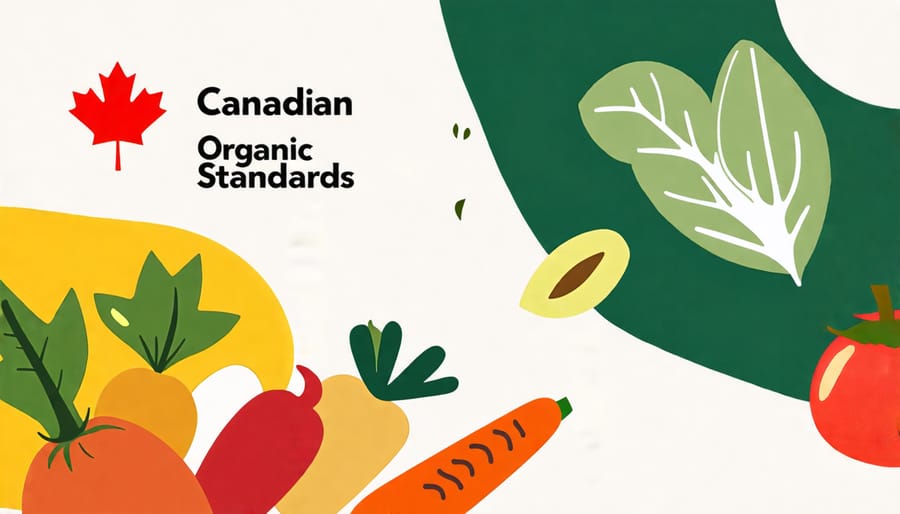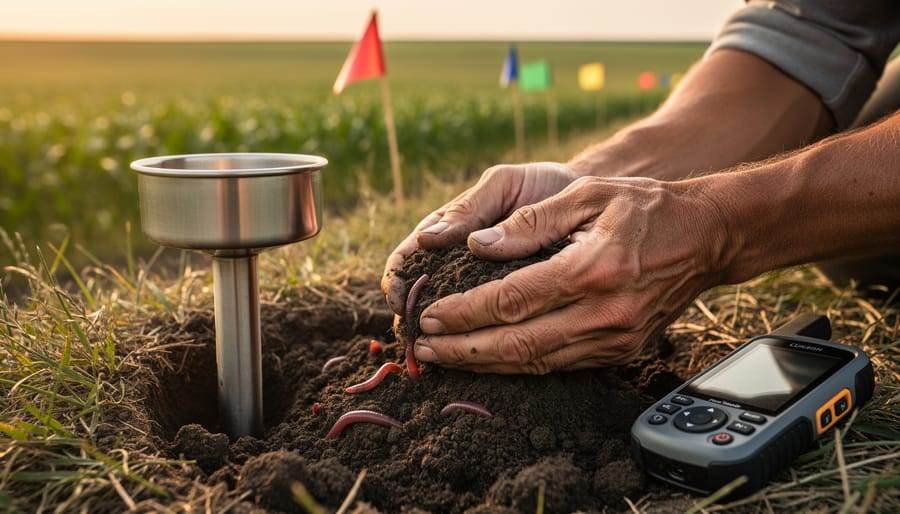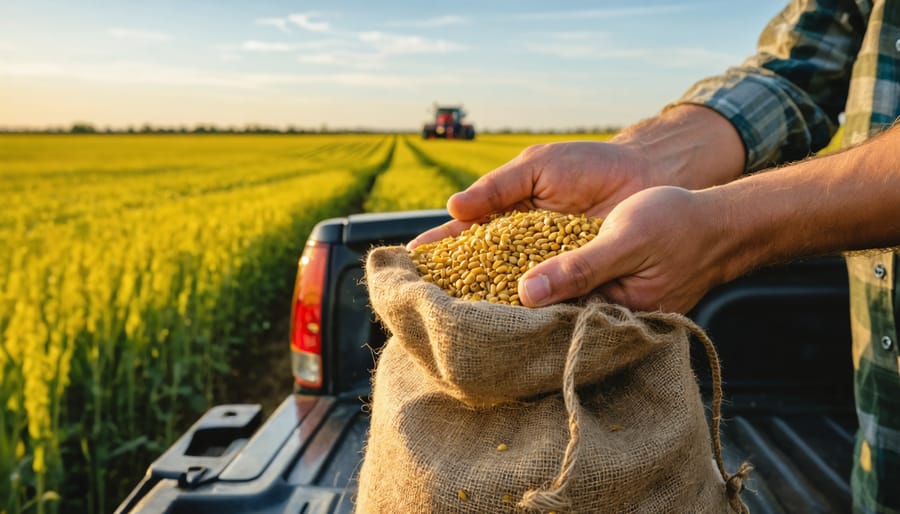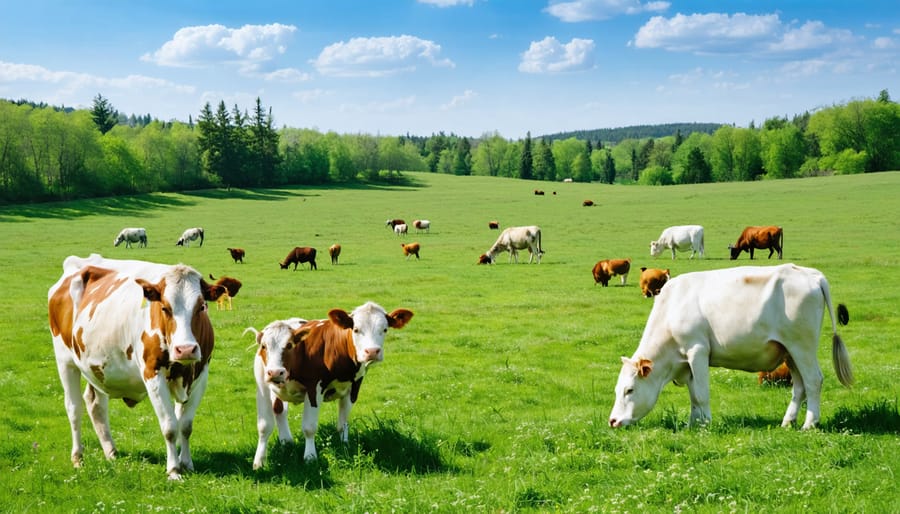Assess soil conditions and select organic-approved pesticides tailored to specific pest challenges. Consult agricultural regulatory bodies to confirm compliance with organic certification standards. Implement natural pest management practices such as crop rotation and biological control agents to complement pesticide use. Engage with local agricultural experts and networks for insights and support.
Understanding Organic Farming Standards

Canadian Organic Standards
In Canada, the Canadian Organic Standards provide clear guidelines for organic farming, effectively balancing agricultural productivity with environmental stewardship. These standards, certified by the Canadian Food Inspection Agency (CFIA), regulate which pesticides may be utilized, ensuring they are derived from natural sources and have minimal environmental impact. Organic farmers in regions such as Alberta are encouraged to implement practices that enhance agroecosystem health, like crop rotation and companion planting, while considering the select, approved list of pest control substances.
For those starting their organic farming journey or seeking continuous improvement, there are resources that offer assistance to organic farmers, presenting opportunities for practical application and community collaboration.
Expert interviews and case studies across Canada highlight the effectiveness of these standards in producing healthy, sustainable crops while fostering knowledge exchange among farmers. By adhering to these guidelines, Canadian organic farmers not only comply with national regulations but also contribute to a progressive movement toward sustainable agriculture, preserving the land for future generations.
Permitted Substances List
When managing organic farming in Canada, including Alberta, understanding the permitted substances list is vital for both compliance and crop success. Certified organic pesticides often include materials like neem oil, diatomaceous earth, and pyrethrin, valued for their natural origins and low environmental impact. These substances are approved under the Canadian Organic Standards, which strictly evaluate their effects on soil health, biodiversity, and human safety. Farmers should follow recommended application practices, ensuring minimal disruption to ecological balance. By adhering to these guidelines, you can enhance your farm’s sustainability while connecting with a community dedicated to environmentally friendly farming.
Essential Pesticides Approved for Organic Farming

Biopesticides: Plant and Microbial-Based Solutions
Biopesticides offer an organic approach to pest management, tapping into the natural defenses of plants and microorganisms to protect crops. These include plant-based oils, like neem and citrus, and microbial agents such as Bacillus thuringiensis (Bt) and beneficial fungi. For Canadian farmers, especially in Alberta, these solutions help maintain soil health while bolstering crop resilience against pests. For instance, Bt is widely used to target specific insect larvae without harming beneficial insects, making it a popular choice in organic vegetable and fruit farming.
The application of biopesticides is not just about replacing chemical counterparts but also enhancing sustainable farming practices. Crop rotation, for example, works synergistically with biopesticides to control pest populations and reduce dependency on chemical interventions. Canadian case studies highlight farms in Alberta successfully integrating biopesticides into their pest management strategies, reducing chemical inputs while maintaining productivity. By adopting biopesticides, farmers are leading a community-focused initiative towards sustainability, enriching agricultural ecosystems and promoting biodiversity.
Mineral-Based Pesticides
Mineral-based pesticides play a vital role in organic farming by providing an effective, natural way to manage pests. Approved for use in organic agriculture, these pesticides consist of compounds derived from minerals, such as sulfur and copper, which naturally combat a range of pests without resorting to synthetic chemicals. In Canada, where sustainable agriculture is gaining momentum, these pesticides align with organic farming standards while supporting the environment and maintaining soil health.
Sulfur, for example, is excellent for controlling fungal diseases in crops like grapes and tomatoes, common in Alberta’s diversified farms. Meanwhile, copper solutions are widely used to manage fungal and bacterial infections in various fruit and vegetable crops. These mineral-based options offer Canadian farmers reliable alternatives that fit ethical and environmental standards.
Emphasizing practical implementation, farmers in Alberta have successfully integrated such methods, showcasing how they not only protect the yield but also encourage biodiversity. By choosing mineral-based pesticides, Canadian farmers join a community that’s committed to sustainable practices, ensuring both environmentally-friendly food production and community health.
Botanical Pesticides
Botanical pesticides, crafted from plant extracts, offer an effective and sustainable option for organic farming. Emphasizing ecological benefits, these pesticides break down quickly in the environment, reducing the risk of harmful residues and promoting biodiversity. Canadian farmers in Alberta have successfully integrated botanical solutions like neem and pyrethrum into their pest management strategies. These natural products can target specific pests while preserving beneficial insects, leading to healthier crop yields. As experts highlight, the adoption of botanical pesticides not only supports organic certification but also reflects a commitment to sustainable agriculture practices that resonate with community values and environmental stewardship.
Case Studies of Successful Organic Pesticide Use in Canada
Alberta’s Organic Pioneers
In the heart of Alberta, a growing number of farmers are at the forefront of organic agriculture, employing innovative pest control methods that abide by organic standards. Kevin and Linda, owners of Green Acres Farm, have turned to natural insect predators like ladybugs to manage aphid populations, illustrating the use of biological control that is both effective and environmentally friendly. Another noteworthy case is Prairie Sunshine Farms, which has successfully implemented neem oil, derived from the neem tree, as part of their integrated pest management plan. This practice not only keeps pests in check but also meets organic certification standards.
Additionally, a collaborative initiative led by Dr. Emily Carter, a local agricultural scientist, is exploring the use of diatomaceous earth in Alberta’s organic farms. By providing a natural barrier that dehydrates pests, it has proven to be a sustainable solution for small-scale operations. These pioneering efforts in Alberta highlight practical, community-driven approaches that inspire confidence and offer valuable insights to farmers across Canada looking to adopt similar sustainable practices.

Lessons from Across Canada
In Canada, organic farmers are harnessing a variety of strategies to effectively incorporate organic pesticides, with each province offering unique approaches and insights. For instance, British Columbia is renowned for its use of naturally derived neem oil, made from the seeds of the neem tree, to combat common pests such as aphids and caterpillars. This approach has proven effective in the province’s diverse climate, ensuring crops remain healthy and pest-free.
Moving eastward, Ontario farmers have embraced the use of diatomaceous earth, a natural dust-like substance that targets soft-bodied insects like slugs and beetles. Its success in Ontario highlights its versatility across different crops and conditions. Meanwhile, in Quebec, the focus has been on microbial-based solutions, such as Bacillus thuringiensis (Bt), a bacteria effective against various caterpillar species, supporting crop resilience and yield.
Throughout Canada, these methods illustrate the adaptability and resourcefulness of organic farming practices. By learning from these diverse experiences, farmers can adopt strategies suited to their local environments, bolstering their commitment to sustainable agriculture across the country.
Expert Insights: Navigating Pesticide Challenges
Innovative Practices from Experts
Engaging with leading experts in the field of organic agriculture has yielded fascinating insights into the innovative practices currently shaping the future of pesticides approved for organic farming. In recent conversations, Canadian agronomists and environmental scientists have shared promising advancements that align with the organic ethos while maintaining effectiveness.
One emergent trend is the increasing adoption of microbial pesticides. These biological solutions utilize naturally occurring bacteria and fungi to combat pests, offering a method that not only protects the environment but also enhances soil health. According to Dr. Emily Fraser, an agronomist based in Alberta, microbial solutions are proving to significantly boost both your crops and our planet. By deploying beneficial microorganisms, farmers can control pests while nurturing beneficial soil biology.
Another pioneering practice gaining traction is the use of botanical extracts. Neem oil, for example, is a plant-derived compound that acts as a potent insecticide. Dr. Richard Liu, a researcher in sustainable agriculture, emphasized its efficacy in managing pest populations without the adverse impacts on non-target species often seen with synthetic pesticides. This approach aligns with the organic principle of harmony with nature, ensuring agricultural productivity and biodiversity can coexist.
Furthermore, experts are advocating for integrated pest management (IPM) techniques that focus on prevention and minimizing pesticide use. By incorporating cover cropping, crop rotations, and natural predators, farmers can create resilient ecosystems that reduce the dependency on chemical inputs.
These expert-backed strategies not only offer practical, sustainable solutions for pest control but also empower farmers to embrace organic farming practices with confidence. By leveraging these advancements, Canadian farmers, especially in the Alberta region, are well-positioned to enhance their yields while committing to environmental stewardship.
Conclusion
In conclusion, choosing the right pesticides for organic farming plays a vital role in maintaining the health of crops and the environment in Canada. By selecting approved organic pesticides, farmers are able to support sustainable agriculture practices, which help preserve the natural ecosystem and ensure the production of healthy, organic produce. Canadian farmers, especially in regions like Alberta, are encouraged to collaborate and share knowledge about effective practices that adhere to organic standards. Taking inspiration from local agricultural case studies and insights shared by experts, farmers can make informed decisions that benefit their lands and communities. By working together, the agricultural community can help cultivate sustainable farming practices that not only support economic viability but also promote environmental stewardship. Embracing these practices represents a crucial step towards a resilient and thriving agricultural future for Canada.











